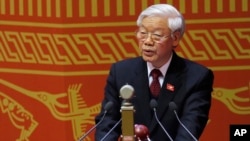Vietnam's ruling Communist Party Thursday opened an eight-day congress to name the country's new set of leaders, who will determine the pace of critical economic reforms, the fight against corruption and relations with key trading allies, China and the United States.
Held every five years, the Communist Party of Vietnam's 12th Congress has brought together 1,510 delegates representing Vietnam's 63 provinces, ministries, and other party organizations.
It ends Jan. 28 when the names of the general secretary, the prime minister, the president, the chairman of the National Assembly and other top functionaries will be announced.
De facto leader
The general secretary is the de facto No. 1 leader of the country, although Vietnam professes a collective leadership through a Politburo that handles day to day affairs, and a larger Central Committee that meets twice a year to decide policy.
In his opening remarks, General Secretary Nguyen Phu Trong (pronounced New-yen Foo Chong), who is expected to retain his post, said "big opportunities have opened up. However, there remain many difficulties and challenges."
He said the country faces four main challenges, including the "danger of being left further behind economically," the degradation of communist ideology, corruption, red tape and wastefulness.
Delegates stood up and clapped when Trong and 15 other Politburo members walked into the conference hall at the National Convention Center near the city center. The stage was set against the backdrop of a bust of the country's revolutionary leader, Ho Chi Minh, portraits of Karl Marx and Vladimir Lenin, and the national flag and the hammer-and-sickle red flag for the party.
Delegates also sang the national anthem and the L'Internationale, the official song of communism.
Few remaining countries
Vietnam is one of the last remaining communist nations in the world, with a party membership of 4.5 million, but like its ideological ally China, the government believes in a quasi-free market economy alongside a strictly controlled society that places several restrictions on its 93 million people.
The congress is not expected to hold any major surprises. Despite the veil of secrecy that the party pulls around its inner workings, it appeared Wednesday that an internal power struggle had ended before the congress, and the tussle was won by Trong, 71, who is expected to keep his job, albeit for half the five-year term in an apparent compromise with his rival, Prime Minister Nguyen Tan Dung (pronounced New-yen Taan Dzoong).
Also, a Dung protege is likely to be given the post of the National Assembly chairman, while the prime minister and the president's posts will go to a neutral candidate and a Trong supporter.
This configuration "would be a demonstrable loss for Dung" but it should not be "confused with an outright win by Trong," said Christian Lewis, a Vietnam expert at the New York-based Eurasia Group think-tank. "It is instead a composition that reflects a desire for a balance and more consensus-driven decision-making at the very top," he wrote in a commentary.
Trong won after it was agreed at a preparatory meeting Wednesday to continue with a controversial 2014 rule barring all but officially nominated candidates from consideration, with no new nominations allowed from the congress floor. Trong was endorsed as the general secretary candidate earlier this month.
Effectively sidelined
This effectively sidelined Dung, 66, who had been vying for the general secretary's post. He is now expected to retire. Although credited with leading economic reforms, he was also accused of promoting cronyism and building a factional power base within the party through patronage politics.
His apparent ouster "represents a clear vote by the top leaders in favor of balance over strong personalities in the make-up of the Politburo," Lewis wrote.
The development raises questions about the direction of economic reforms Dung had been backing. The reforms have brought a flood of foreign investment, created a fledgling stock market and helped triple per capita GDP to $2,100 over the past 10 years, but his rivals accuse him of economic mismanagement and failing to control massive public debt and non-performing loans of state-owned banks.
But, Lewis said, the new set of leaders will support the current economic reforms and trade policy. Notably they remain committed to the Trans-Pacific Partnership with the United States and other key trade deals including the free trade agreement with the European Union.
"Vietnam wants to diversify its economic partners to avoid becoming excessively dependent on China," Lewis said.
Vietnam has an ambivalent relationship with China. Despite being its largest trading partner, China is also a security challenge. Beijing has been expanding its territorial assertions in the South China Sea, but Vietnam has pushed back against those claims. Dung has been seen as standing up to Beijing, not afraid to criticize it, while Trong was seen as being soft on China.
US-Vietnam relations
Still, the new leaders will be particularly positive for U.S.-Vietnam relations, said Lewis, pointing out that Trong's visit to the U.S. in July 2015 was well received.
Over the next week, the congress will review and set national and party policies, and select a Central Committee. On one of the last days of the congress, the new Central Committee will meet to select a Politburo from among its ranks and pick one of them as party general secretary.
The country's three other top leaders -- prime minister, president and National Assembly chairman -- are nominated, but their actual selection is done by the National Assembly, which itself is elected about six months after the Congress.
All this is done behind closed doors. No media are allowed to cover the proceedings.




